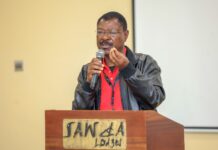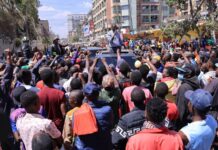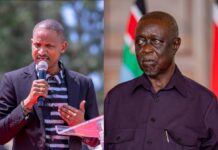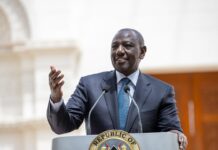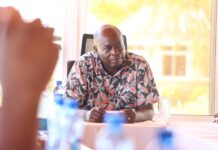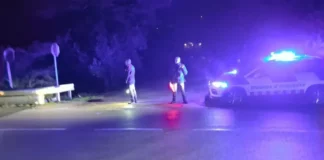President William Ruto has sharply criticized the Judiciary following a landmark court ruling that declared police roadblocks and barricades within Nairobi’s Central Business District (CBD) unconstitutional.
Speaking on Tuesday, the President openly questioned the reasoning behind the decision by High Court Judge Lawrence Mugambi, accusing the courts of prioritizing legal formalities over the safety of ordinary citizens.
“Nimeona ati leo ato kuna mtu kortini amesema Inspector General of Police asiweke roadblock, ati asitumie water cannon, asitumie teargas kulinda mali na maisha ya Wakenya wengine,” Ruto said in a pointed speech.
“Huyo anasema hivyo, lakini yeye mwenyewe anachungwa na polisi… gari yake inaongozwa na askari. Alafu anasema mali ya wananchi wengine haina maana.”
The ruling, issued on Monday, followed a petition filed by the Katiba Institute. The court found that the heavy police presence and roadblocks mounted on July 7 — during the Saba Saba protests — violated constitutional rights to peaceful assembly, protest, and free movement, as outlined in Articles 37 and 39 of the Kenyan Constitution.
Justice Mugambi ordered the immediate removal of all unauthorized roadblocks, barbed wire, and barricades from the CBD, except for minimal security zones near sensitive installations.
“The barbed wires, barricades and police blocks blocking citizens from accessing the Central Business District and its streets must be removed,” ruled Justice Mugambi, calling the state’s security response excessive and unjustified.
In his defense of police actions, President Ruto maintained that tools like tear gas, roadblocks, and water cannons are critical for protecting lives and property, especially during moments of public unrest.
“There is a reason why there is a roadblock. There is a reason why police have tear gas. There is a reason why water cannons are there — they are supposed to protect the lives and property of Kenyans when they are in danger.”
The comments mark an escalating standoff between the Executive and the Judiciary, as Ruto shifts blame for growing public disorder and insecurity not just to protest organizers, but now to court decisions perceived to be hindering law enforcement.
The court’s ruling came amid criticism of the government’s security response to the July 7 Saba Saba demonstrations, where roads into Nairobi were barricaded, paralysing access to the city and drawing backlash from civil rights groups.
Legal experts and rights activists have warned that the president’s remarks could further strain relations between the Executive and the Judiciary and potentially undermine the independence of the courts.













